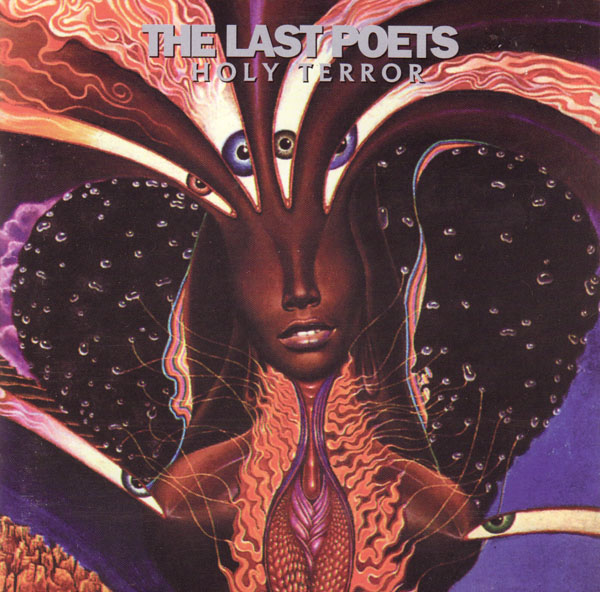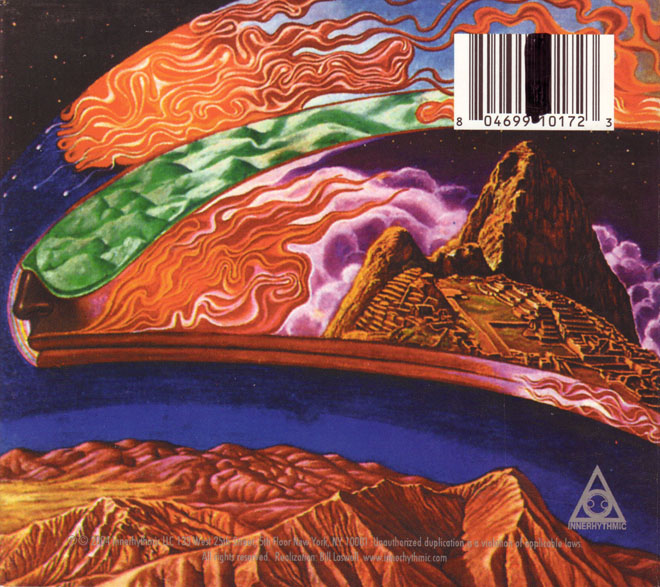THE LAST POETS








1/ Invocation (Oyewole) 2.01
2/ Homesick (Hassan,Mel,Laswell,Collins) 8.20
3/ Black Rage (Oyewole) 5.19
4/ Men-Tally (Hassan,Mel,Laswell,Collins) 5.15
5/ Pelourinho (Oyewole) 5.16
6/ Funk (Hassan,Mel,Laswell,Collins) 6.06
7/ If We Only Knew (Oyewole) 3.28
8/ Illusion of Self (Hassan) 8.17
9/ Talk Show (Hassan) 5.32
10/ Black and Strong (Homesick) (UBH,MM,BL,BC,Clinton,AO) 11.29
11/ Last Rite (Oyewole) 1.11
Recorded and mixed at Greenpoint Studio, Brooklyn, New York
Engineered by Robert Musso and Oz Fritz
Assistant: Imad Mansour
Produced by Bill Laswell
Associate Producer: Tracy McKnight
Business Maintenance: Stephen Saporta
Militant Maintenance: Peter Wetherbee/Bill Murphy
Esq. Maintenance: Robert Donnelly
Mastered by Howie Weinberg at Masterdisk
Umar Bin Hassan: voice; Abiodun Oyewole: voice; Grandmaster Melle Mel:
voice; Bootsy Collins: guitars, bass; Bernie Worrell: organ, piano, clavinet,
synthesizer; Bill Laswell: bass, beats, samples, loops; Aiyb Dieng: congas,
chatan, bells, talking drum, doff, tambourine, gongs, percussion; George
Clinton (10): voice; Don Babatunde (10): conga.
1993 - Black ARC/P-Vine (Japan), PLP-6565 (Vinyl)
1993 - Black Arc/P-Vine (Japan), PCD-2499 (CD)
1995 - Black Arc/Rykodisc (USA), RCD 10319 (CD)
2003 - Innerhythmic (USA), INR017 (CD)
2016 - Bill Laswell Bandcamp (digital only)
Note: The P-Vine release does not include track 10.
Tracks : 10 tracks and somewhere near 53 minutes
Label : Black Arc
Producers : Bill Laswell
Profanity : Hardly
The Last Poets.
Well, they're back. Some of the first rappers and some of the last poets are back. Now, last time, scant minutes ago by my reckoning, I reviewed their first album, The Last Poets, from 1970. The poets at that time were Abiodun Oyewole, Alafia Pudim and Omar Ben Hassen with Nilaja on percussion.
Now, it's 1995, a quarter century has passed. The album is Holy Terror and the poets are Abiodun Oyewole, Umar Bin Hassan (once Omar Ben Hassen) and Grandmaster Melle Mel (yes, that Grandmaster Melle Mel). They are joined by Bootsy Collins on guitars and bass; Bernie Worrell on organ, piano, clavinet and synthesizer; Bill Laswell on bass, beats, samples and loops; and Aiyb Dieng on congas, chatan, bells, talking drum, doff, tambourine, gongs and percussion.
Got it?
Now, I lavished well-deserved praise upon The Last Poets. It was--and is--slammin'. Well, most of the things that made The Last Poets so damn good are here as well. In fact, really, only one thing is missing: the feeling of a jazz-like interplay of the voices between the poets. On the early stuff, one gets the feeling that, even though only one poet is really featured on any given track, that they're all in the same room and kind of making things up as they go along, letting the moment lead them into improvisation. Here, one gets the feeling that they're all in separate rooms.
That's seriously too bad, but, I'm happy to say, they're all in separate rooms still dropping knowledge and usually impressing the hell out of me when all is said and done.
We begin with "Invocation." This introduction features Oyewole giving us a proper history lesson on The Last Poets.
"And a South African poet names Kgositile said,
'This Wind You Hear Is The Birth of Memory'"
The segues nicely into "Homesick" featuring Umar and Melle Mel.
"I see a slave that's on a ship
His back is getting whipped
His great great great grandson's a crip
That's a trip"
Well, there's serious muzak behind them this time, a far cry from the sparse, if extremely elegant, percussion of Nilaja.
"So much blood
How can we forget?
A seat in the audience of the grammy awards?
How can we forget?
A news anchor job telling respectable lies?
How can we forget?"
It's so weird hearing the juxtaposition of Umar's sing-songy style and Melle Mel's old school rappin'.
"Take that word insane and make it warrior
Take that word crazy and make it poet
Take that word suicidal and make it live"
"We owe no explanations
We owe no apologies
Ours has been a struggle of gun battles
and bullets whizzing past"
"Not afraid of giving too much too soon and looking too foolish."
And, yes, I made that point just so I could use "juxtaposition" in a sentence. Sorry.
Anyway, Oyewole returns on "Black Rage."
"Grenades in their eyes
and death is their prize"
"There are bombs standing
on the corners of the cities
waiting to explode
at the slightest touch
baggy shadow street boys
stand cocked ready to fire
their eyes are grenades
and the pin is about to be pulled
Boom! The brother went off
pressure pulled the trigger
and the brother became a nigger
and no one could figure out how it happened
What went wrong?"
The music is particularly good on this one. It does what such things should always do: set the proper mood. Oyewole does the rest.
"They are diamonds treated like worthless stones
They are rivers with nowhere to run"
Umar and Melle Mel juxtapose again in "Men-tality." This time Umar gives in to Mel's peer pressure and makes certain that everything rhymes.
"The truth becomes pretense
The lie becomes bold"
"The end becomes question
Morals are closed but then open to suggestion
Shady positions without shade in the trees
Major destruction in minor degrees"
Nice effort. This brings us to "Pelourinho" again with Oyewole. This is, he tells us, "where they brought the Africans, where they tried to make them slaves." He's starts off by kinda singing. Yes, well. That doesn't last long
and we get to the meat of the matter.
"You can feel the whip
Hear the cries
and see the blood in the red clay
the clay that holds the stones together is African"
"The chains did not break the spirit
Did not enslave the music of my soul
Did not shackle the will of my freedom"
It all works. In fact, by the end, one can even forgive him for singing.Anyway, we're shocked immediately by the strains of "Give Up The Funk" as it's being sampled in "Funk." Well, I was shocked. Melle Mel opens up before turning things over to a somewhat shocked-sounding Umar.
"Deep in that moment when funk becomes art"
You know... this is a funky track.
"Caught up in his funk
Caught up in his charm
Caught up in his magic
but not his alarm"
I think this time, the music trumps the lyrics and delivery, though. I found myself singing the words in the background more than trying to learn the words in the foreground.This isn't the case at all with "If We Only Knew." Oyewole steps up to the mic and he's swinging.
"We need to own the joint
Instead of working as a waiter"
"Trying to use common sense where life is insane"
He sounds oddly like Melle Mel. I find that disconcerting for some reason.Alas. Umar returns in very top form with "The Illusion of Self."
"The Holy Terror becomes the holy blessing
Family values caught in the act of undressing"
I like the organ.
"Yes, we once knew love
We once held it here inside
while beating it to death"
"Rational mind be quiet
Ego be still
Learn to accept
Learn to be real"
Umar continues with "Talk Show."
"A fashion model with a radiant smile
Concealing her darkness while exhibiting style
Pole dancers with the greatest of ease
Major intelligence becomes a minor striptease"
"Feeling that difference then feeling the same
Wanting the prize but not the game"
"Why do we make them outlaws when there really is no crime
Why do we try to deny them when we know we need them so
Why do we try to ignore them but are afraid to let them go"
Oyewole wraps things up with the outro "Last Rites."
"The children are singing our songs
In the absence of a movement
they rebel among themselves
We will change that
We will be the light to show them the way
We will be the fire for the torch
We will be the tidal of the wave
Ring the bell, the sh*t is on
Daddy's home"
And here we are at the bottom line.What to say?
Well, the easiest thing to do, I guess, would be to compare Holy Terror to The Last Poets. I guess, Holy Terror loses that comparison. Of course, that doesn't tell one much since Last Poets is all that and a bowl of hot grits.
And, of course, it's easier to like: it's got an angry intensity and sense of urgency that one can't help but empathize with. Holy Terror is made by older people with older voices and older eyes. Wise focused reflection always loses to young bravado and energy. I suspect most fans of the latest hip hop will be more enamored with the first album. In fact, I know they will.
But that's not really fair, is it? Holy Terror, when all is said and done, stands on its own. Like Be Bop or Be Dead, it has its own power and energy and is well-worth owning, not just by fans of the Last Poets but by Hip Hop heads and especially those Hip Hop Heads who appreciate and seek to understand the depth and breadth of the culture that they profess to love.
If I could give the honored poets of today some advice, though, it would be this: give me the impression that you're in the same room mixing it all up. This stuff is great, but it's easy to see how to make it better. There's magic in the angry, pointed lyrics found in "Run, Nigger" and "Niggers Are Scared of Revolution"; however, the real magic is in their jazz-like cadences and the interplay of each of the voices. The emotion is in the words, yes, but much of it is in the feeling that there's a group of people supporting each word and each other.
That's my advice to the poets, given respectfully. And as for you, reader, I guess all I can say to you is that you've got at least two Last Poets albums to buy, don't you? And while, you're at it, pick up The Best of Gil Scott Heron and Spirits by Gil Scott Heron and Be Bop or Be Dead by Umar Bin Hassan. You may find them under "H," but if you don't, do what I did and look under "L" for "Last Poets."
I'm glad we had this chance to talk.
But that's just one Black man's opinion--what's yours?
Charles L Isbell, Jr. (courtesy of the The Homeboy From Hell website)